A Life in Focus: John Smith, Labour Party leader, 1992 to 1994
The Independent revisits the life of a notable figure. This week: John Smith, British politician, from Friday 13 May 1994
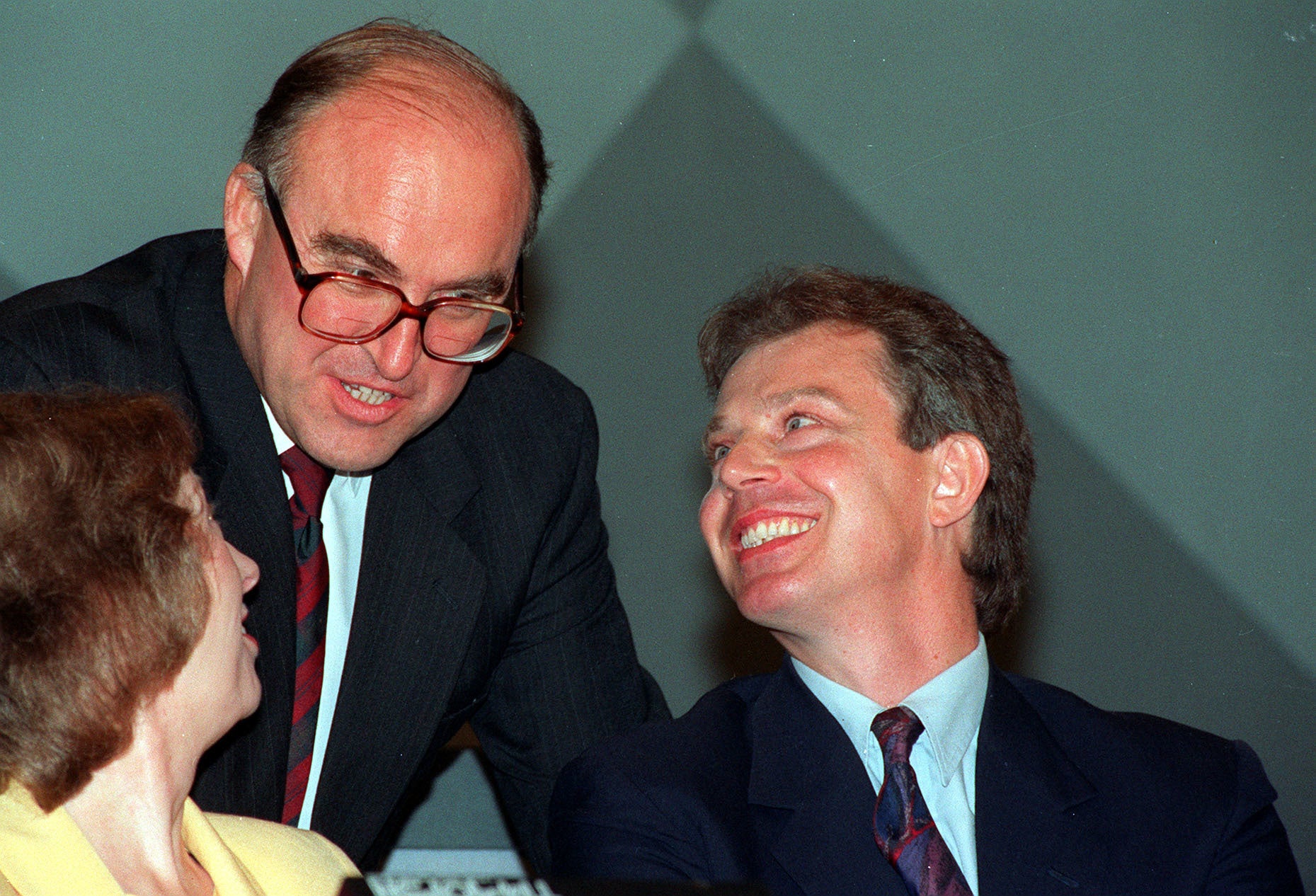
Your support helps us to tell the story
From reproductive rights to climate change to Big Tech, The Independent is on the ground when the story is developing. Whether it's investigating the financials of Elon Musk's pro-Trump PAC or producing our latest documentary, 'The A Word', which shines a light on the American women fighting for reproductive rights, we know how important it is to parse out the facts from the messaging.
At such a critical moment in US history, we need reporters on the ground. Your donation allows us to keep sending journalists to speak to both sides of the story.
The Independent is trusted by Americans across the entire political spectrum. And unlike many other quality news outlets, we choose not to lock Americans out of our reporting and analysis with paywalls. We believe quality journalism should be available to everyone, paid for by those who can afford it.
Your support makes all the difference.Thirty-one years ago, Hugh Gaitskell died when seemingly on the threshold of becoming prime minister. Since that awful January morning in 1963 I have not experienced the same sense of numb shock among my colleagues in the parliamentary Labour Party – and among members of all parties in the House of Commons – until the announcement of John Smith’s death yesterday morning.
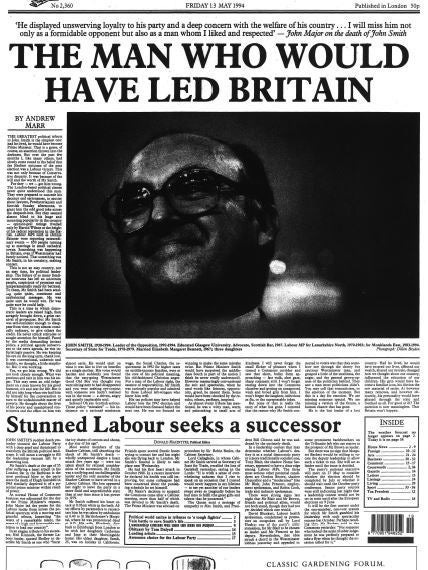
Extended speculation on what might have been is indecent at such a moment. But Smith would have made an effective and, with luck, a great prime minister. He was as clever as Gaitskell, and possessed advantages that Gaitskell did not – respect for the integrity of those who took a different view, a well-developed ‘forgettory’ about past political disagreements and sparkling good-humour on most occasions.
He was one of the wittiest raconteurs in public life, with the capacity to reduce his friends to hysterical laughter – and yet he had an undoubted sense of personal authority when the occasion required it. These were a very unusual combination of talents.
Further, Smith’s credentials by birth, upbringing and political activity since teenagehood bestowed on him a control over the Labour Party and a loyalty among its members that Gaitskell – Winchester, New College, Oxford, and the senior civil service – could never have enjoyed.
John Smith was born in 1938 at the Baddarroach boarding house, Dalmally. The circumstances are instructive for an understanding of Smith’s later life. His father, Archibald Smith, whom in old age I knew as the incarnation of the best kind of pre-war Scottish dominie, learned, serious and of severe integrity, was at that time the headmaster of the primary school at Portnahaven on the island of Islay, off the west coast of Argyllshire. He came from a family of fishermen and plumbers who worked mostly on a seasonal basis.
John Smith’s maternal grandfather, Robert Scott, was a quarryman, and his occupation was to feature not so gently in John Smith’s selection as Margaret Herbison’s successor for the mining seat of North Lanarkshire in 1970. He worked at Bonawe quarry, northeast of Oban, near where the river Awe empties itself into Loch Etive.
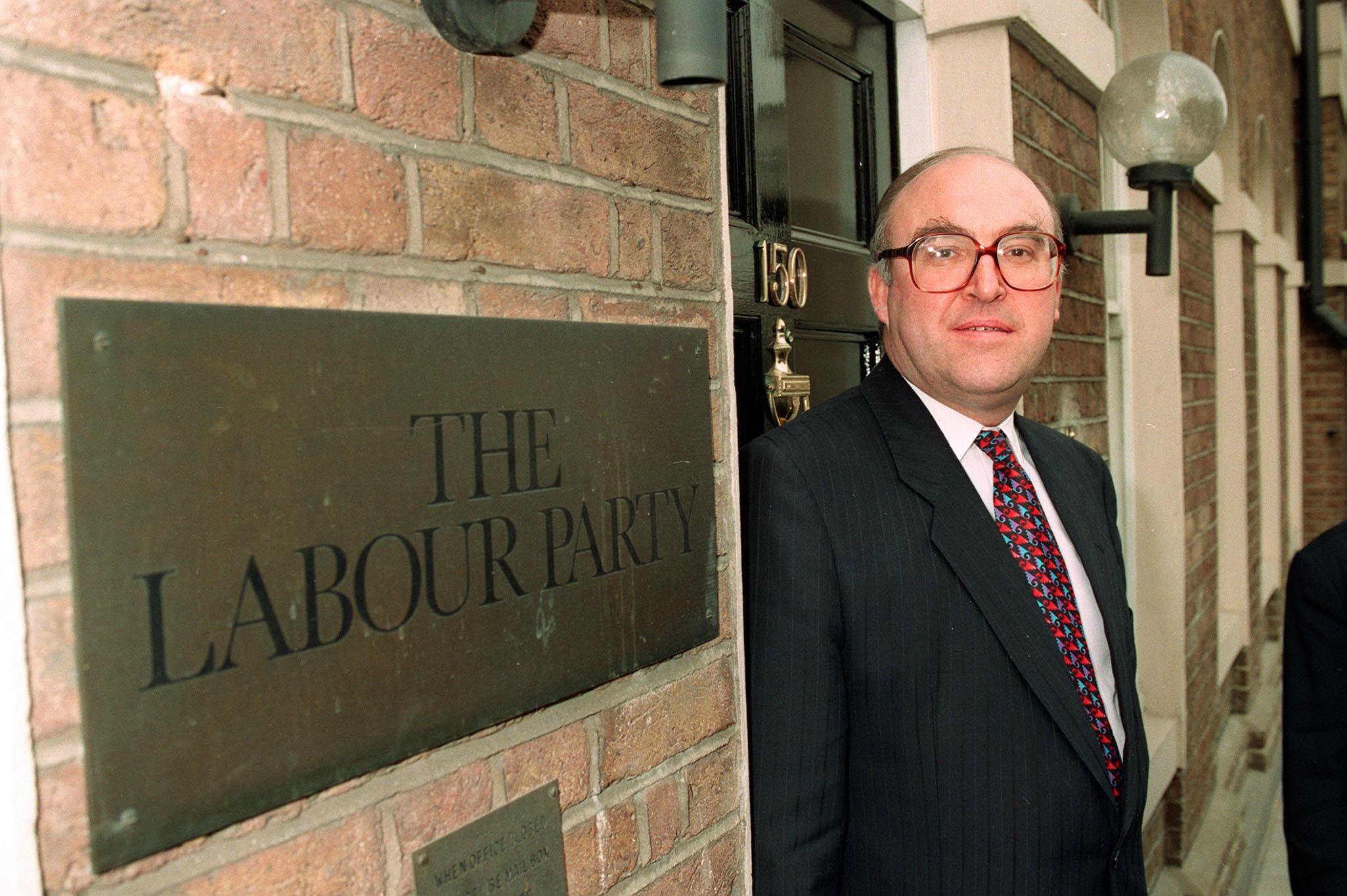
Smith regretted that he never knew his grandfather, but throughout his political life he was fiercely sympathetic to those who suffered from mining accidents from pneumoconiosis, silicosis, emphysema, and chronic bronchitis and those who suffered an early death as his grandfather had done, howking minerals out of the earth. The miners were special to Smith as a matter of the heart, even if he was often dismayed by the actions of the National Union of Mineworkers.
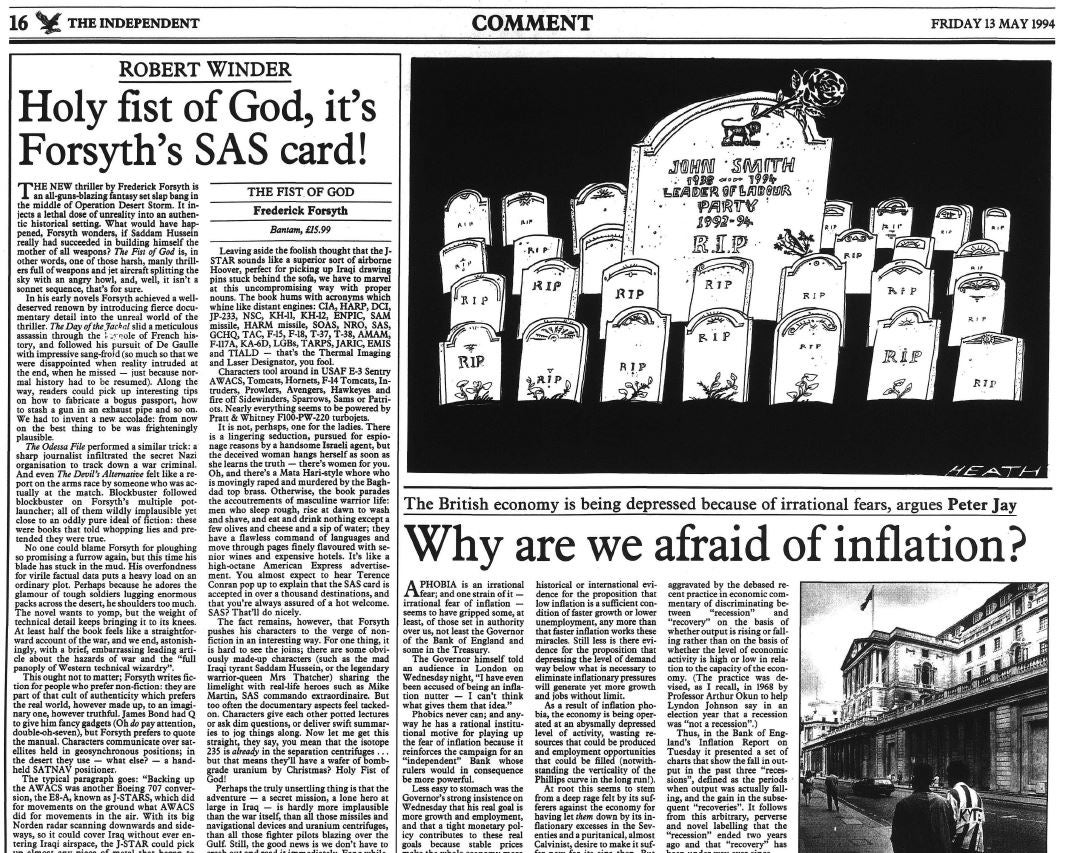
Smith’s maternal grandmother, on early widowhood, moved inland to the northern tip of Loch Awe to run a boarding house. It was hither that her daughter, Sarah, a commercial artist on Islay, came from the island to give birth to the future cabinet minister and leader of the opposition on the Scottish mainland in case there were complications.
In 1940 Archibald Smith was promoted by the Argyll County Council education committee to be headmaster of Ardrishaig primary school, on the shore of Loch Gilp, near Loch Fyne. Two years ago, when my wife was asked to be the judge by Scottish Waterways of prizes for well-kept locks on the Crinan and Caledonian canals, we met people in Ardrishaig who had known the Smiths.
They recalled that “Hairy” Smith, as the headteacher was nicknamed, taught in the school adjoining the family home and was strictest of all with his own son, who attended his father’s school between the ages of five and 11. Some years ago I asked John Smith what he considered had been the effect of being taught by his own father. He paused and reflected, "Well, he always expected me to get the answer right, even if the other children didn’t. And I soon found out that it was easier for me to get the answer right." Smith, in turn, throughout his life was, like his father, a great one not only for pedantic accuracy but for correcting people on fact as he saw it – which is partly why two professors of law who taught him at Glasgow University told me that they had never had a better student lawyer of the forensic type.
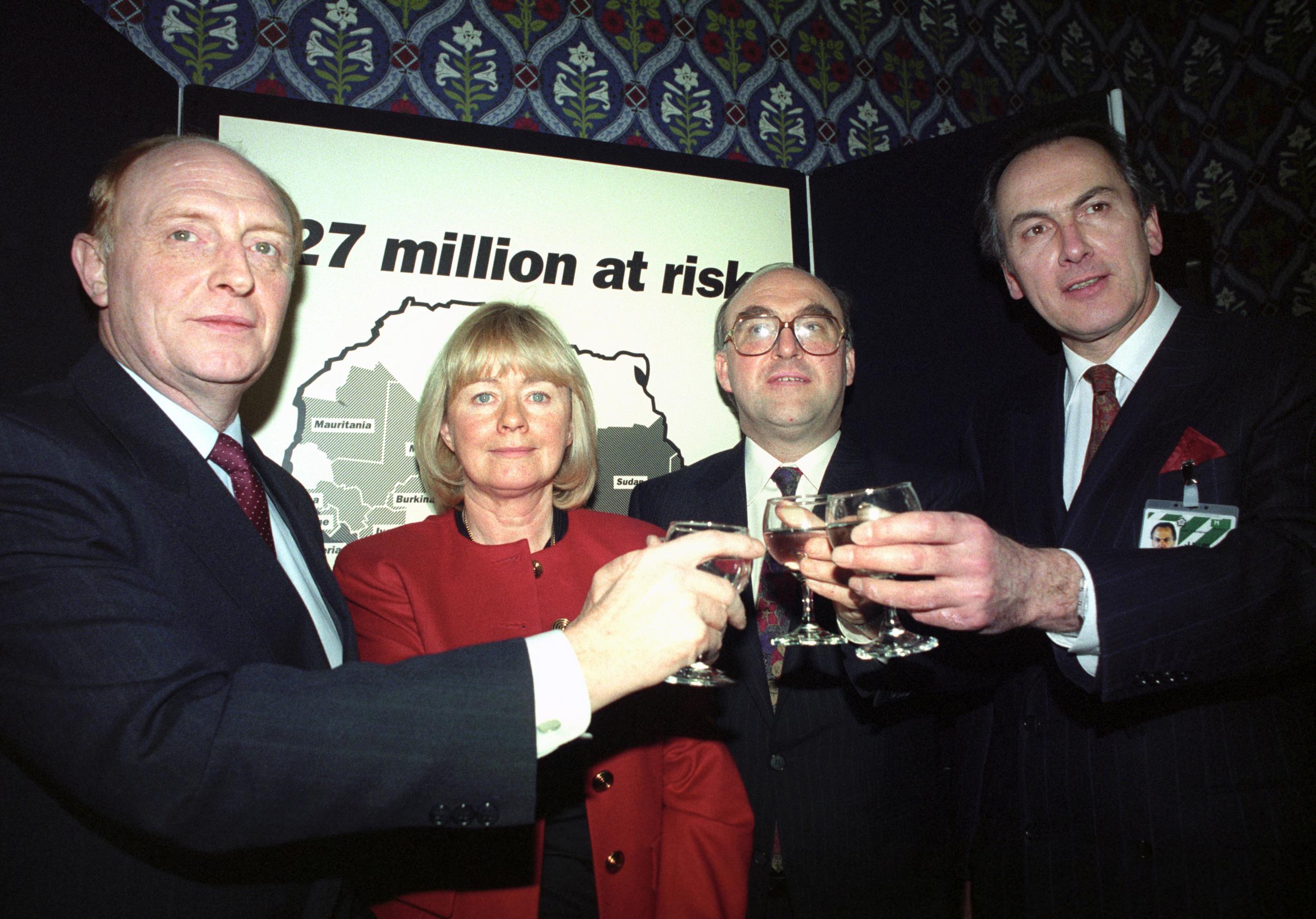
Smith would unerringly latch on to the weakest point in a political opponent’s argument or a verbal ambiguity and flog it for what it was worth to his own advantage. In the 1970s, he greatly irritated some of us by repeatedly scoring debating points in the parliamentary Labour Party meetings on behalf of the Top Table, the shadow cabinet of the day, on contentious issues such as troops in Ireland where dissenters thought that the issues were not nearly as clear-cut as Smith made out. Indeed, the only occasion on which I had angry, heated words with Smith was after a PLP meeting on troops out of Ireland, when I accused him of being “Harold Wilson’s tame attorney” on a subject in which he had hitherto displayed no interest whatsoever. That said, I acquit Smith completely of simply being a career politician on the make.
In truth, he was a complex mixture of the ruthless Glasgow University debater, the Edinburgh criminal lawyer and the emotional West Highlander. Callum MacDonald, MP for the Western Isles, perceptively observes:
"That John Smith was a West Coast Highlander by birth and background, came across strongly in three ways. First, that socialism for John was not about dry theories on narrow sectional interests but about values, principles, and moral beliefs. Second was his great democratic and egalitarian quality – that he could relax with absolute ease in any circle of people. And third, the sense he gave of being a man with a healthy ‘hinterland’ – a man with a passion for politics but also with strong roots in his family, in Scottish society, and the land that he came from."
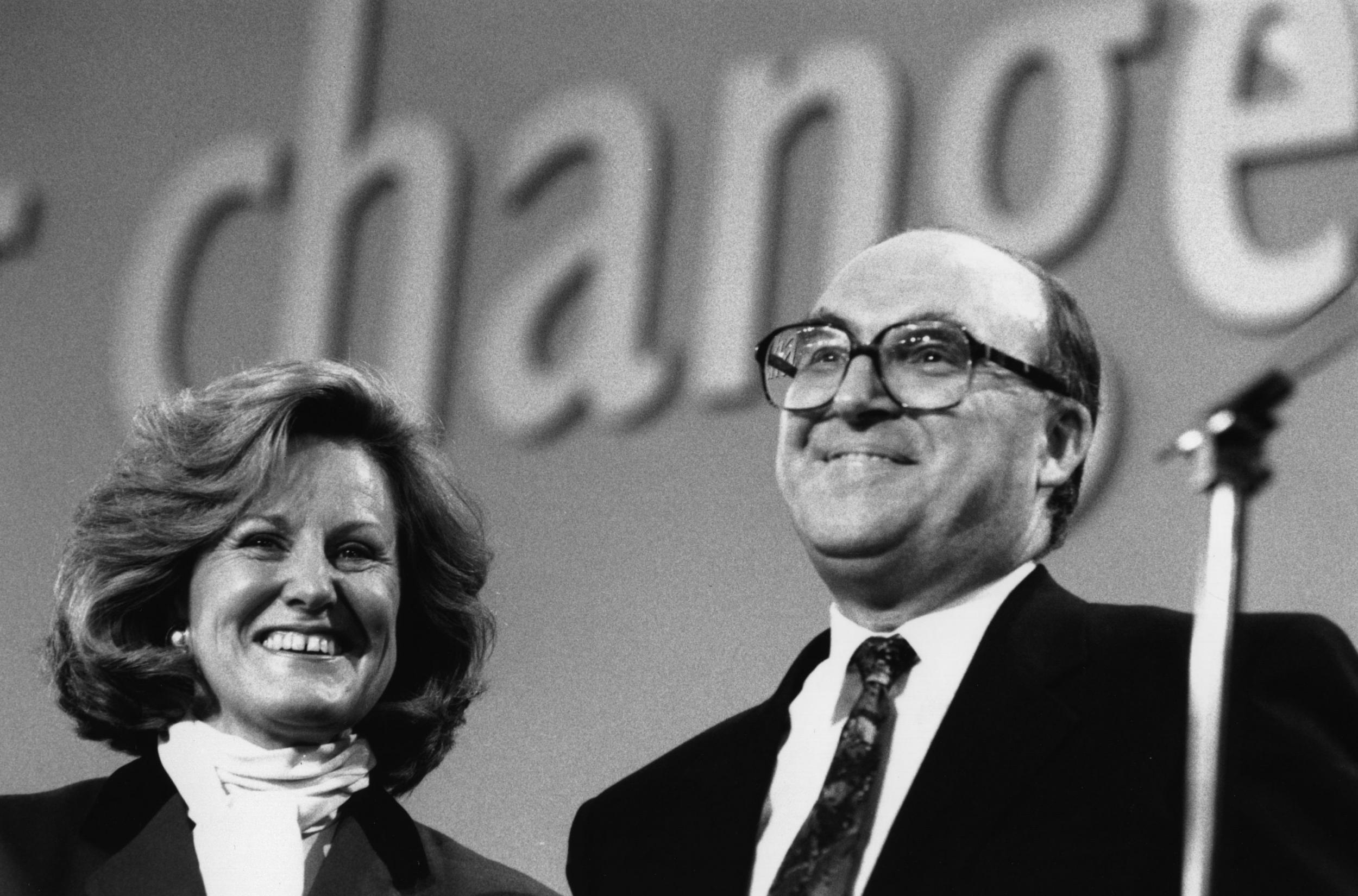
Commenting on the party’s better results in Scotland than in England, Smith would say to me, "Labour has nothing to be ashamed of that we are the Scottish Establishment. It does help pull in the votes of serious people."
After attending Dunoon Grammar School (Alma Mater also of Professor Bill Stewart FRS, John Major’s science adviser, George Robertson MP, shadow Scottish secretary, and Brian Wilson MP, shadow transport minister), Smith went to Glasgow University for seven years as a student of history and of law. (The Chancellor of Glasgow University, Professor Sir Alec Cairncross, was due to make him an Honorary Doctor of Law next month – an honour which Smith valued above all others.) Smith took to university life like a duck to water.
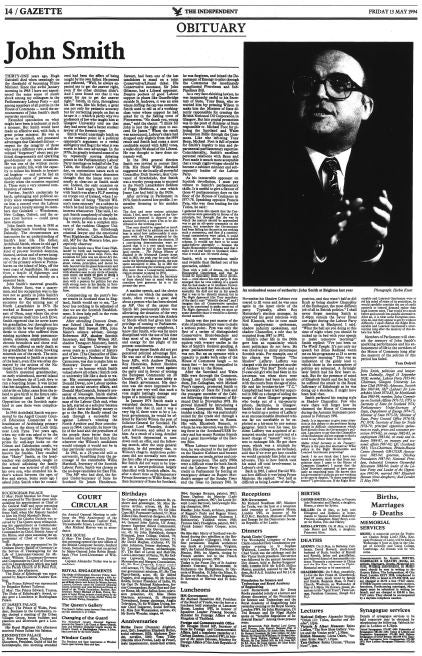
His contemporaries included Donald Dewar [died 2000], now Labour spokesman on social security affairs, and Donald MacCormick [died 2009], formerly presenter of Newsnight. Smith starred in debate, won prizes, became chairman of the Labour Club and, when he left, started as a solicitor because he didn’t have the family money to go to the Bar. He finally raised the cash through a successful bet against Labour’s winning the North Ayrshire and Bute constituency in 1964; typically, he knew the lie of the land and the prejudices of the people there better than the bookies and backed his hunch that wherever else Wilson’s candidates would triumph it would not be in that particular constituency.
In 1961, as a 23-year-old still at university, benefiting from the patronage of the remarkable Willie Marshall, secretary of the Scottish Labour Party, Smith was chosen as the no-hope candidate for East Fife.
The MP who had died, the former under-secretary of state for Scotland Sir James Henderson-Stewart, had been one of the last candidates to stand on a joint Conservative/Liberal ticket. His Conservative successor, Sir John Gilmour, had a Liberal opponent. Despite pockets of good Labour support in places like Guardbridge outside St Andrews, it was an area where doffing the cap was common.
Smith used to tell us of a working-class voter whose support he had asked for in the fishing town of Pittenweem. “No thank you, young man,” said the elector. “I think Sir John is just the right man to succeed Sir James.” When the result was announced, Labour’s share had dropped only slightly from the 1959 result and Smith had come a most creditable second with 8,882 votes, a wafer-thin 96 ahead of the Liberal. He was thought to have done extremely well.
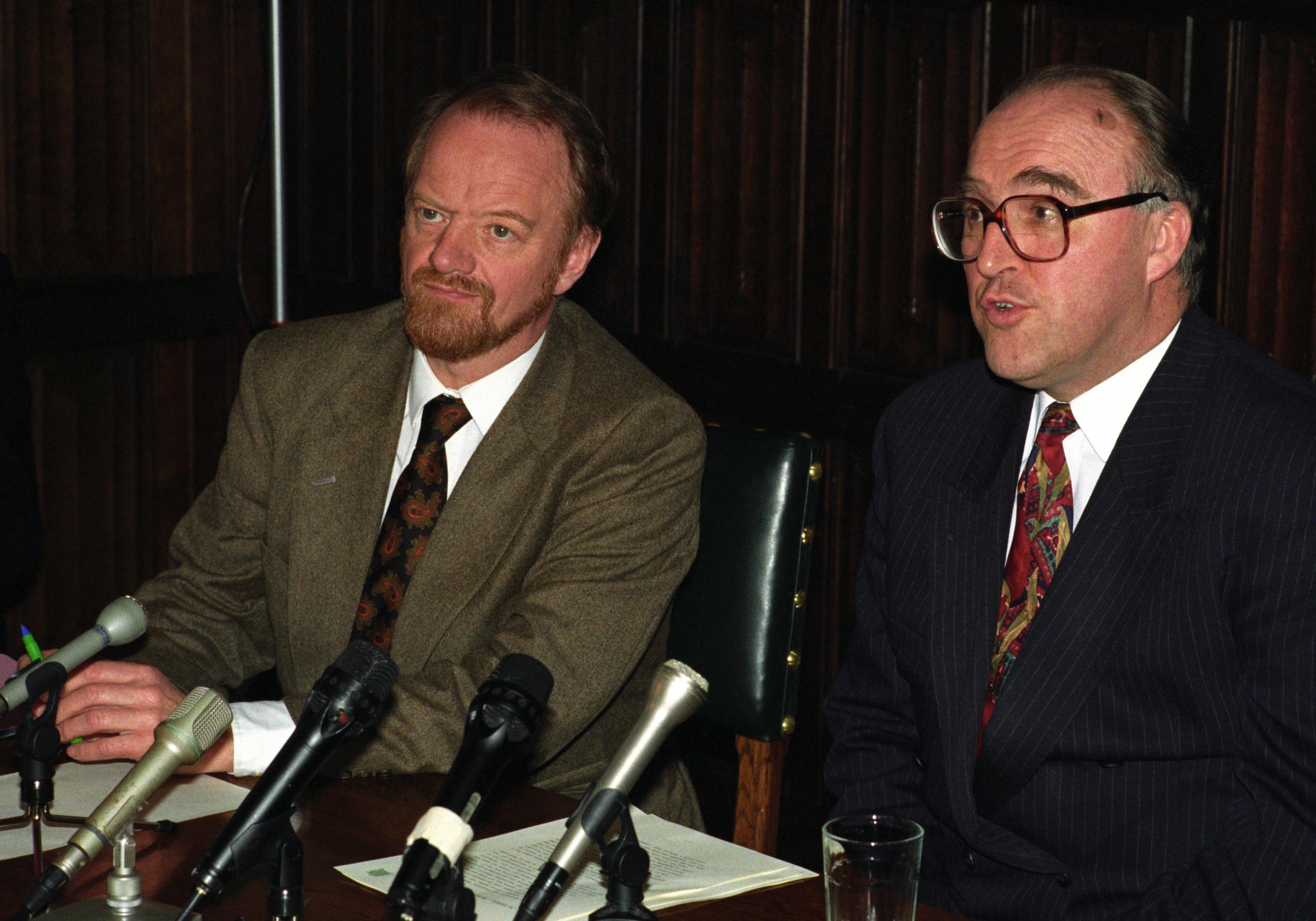
In the 1964 general election Smith was invited to contest East Fife. His friend Willie Marshall suggested to the locally all-powerful councillor Dick Stewart, later Convenor of Strathclyde, that Smith was a worthy young man to succeed to the North Lanarkshire fiefdom of Peggy Herbison, a seat which Jenny Lee had held in the 1920s.
After arriving in Parliament in 1970, Smith started low-profile. I remember listening to his maiden speech.
The first and most serious criticism which, I feel, must be made of the Government’s proposal is directed to the amount involved, a mere £7m to be distributed to the working poor:
"That sum should be regarded as insufficient in itself but in addition one has to bear in mind how unfavourably it compares with the £30m promised by the Conservative Party before the election. If a convincing demonstration were required that it is a very small sum, recourse might be had to the Speenhamland system . . . The Pelican History of England in the Nineteenth Century notes that in 1818, the peak year for poor relief under the Speenhamland system, the sum spent amounted to pounds £8m. So in 1818 the system of relieving the working poor cost pounds £1m more than a Conservative administration propose to spend in 1970.
"That is the statistic that the secretary of state should bear in mind when he considers how generous he is to the present-day poor."
A maiden speech, and the choice of subject on which the maiden is made, often reveals a great deal about a person who has been elected an MP. One of the causes that Smith felt passionately about was alleviating the situation of the very poorest people in towns like Airdrie or Shotts which had given him the privilege of coming to parliament. As his parliamentary neighbour, I know that Smith, who was far more disciplined with the use of his time than most of us, always had time and energy for the plight of his poorest constituents.
On great issues Smith did not put perceived political advantage first. He was one of five remaining Labour MPs, with Andrew Faulds, Roy Hattersley, Robert Sheldon and myself, to have voted against the party and in favour of joining the European Community on 28 October 1971, in the same lobby as the Heath government. His decision was the more impressive because he saw very well that such a vote might lastingly damage any hopes of a ministerial career.
In January 1974 Smith made a watershed decision. Rumour had reached him that if, and it was a very big if, there were to be a Labour government, he would be offered by Harold Wilson the post of solicitor-general for Scotland. He phoned Lord Wheatley, Attlee’s lord advocate, and asked to see him. As a result of a long, detailed talk, Smith determined to turn down such an offer, and the following month, after the snap general election, he did precisely that, to Wilson’s chagrin. Ambitious politicians did not normally turn down the first offer of a government post. But Smith did not want to be typecast as a lawyer-politician largely identified with Scottish affairs. So, after a short time as parliamentary private secretary to Willie Ross, the then secretary of state for Scotland, he was forgiven, and joined the Department of Energy to pilot through the Commons the inordinately complicated Petroleum and Sub-Pipelines Bill.
As a very fast-thinking lawyer, he was immensely useful to his secretary of state, Tony Benn, who rewarded him by pressing Wilson to make him the minister of state directly responsible for creating the British National Oil Corporation in Glasgow. But his crucial promotion was to the post of minister of state responsible to Michael Foot for piloting the Scotland and Wales devolution bills through the Commons. Like the left-wing Tony Benn, Michael Foot is full of praise for Smith’s loyalty to him and departmental parliamentary expertise. Coincidentally, Smith’s excellent personal relations with Benn and Foot made it much more acceptable that a tough right-winger should be become a cabinet minister and subsequently leader of the Labour Party.
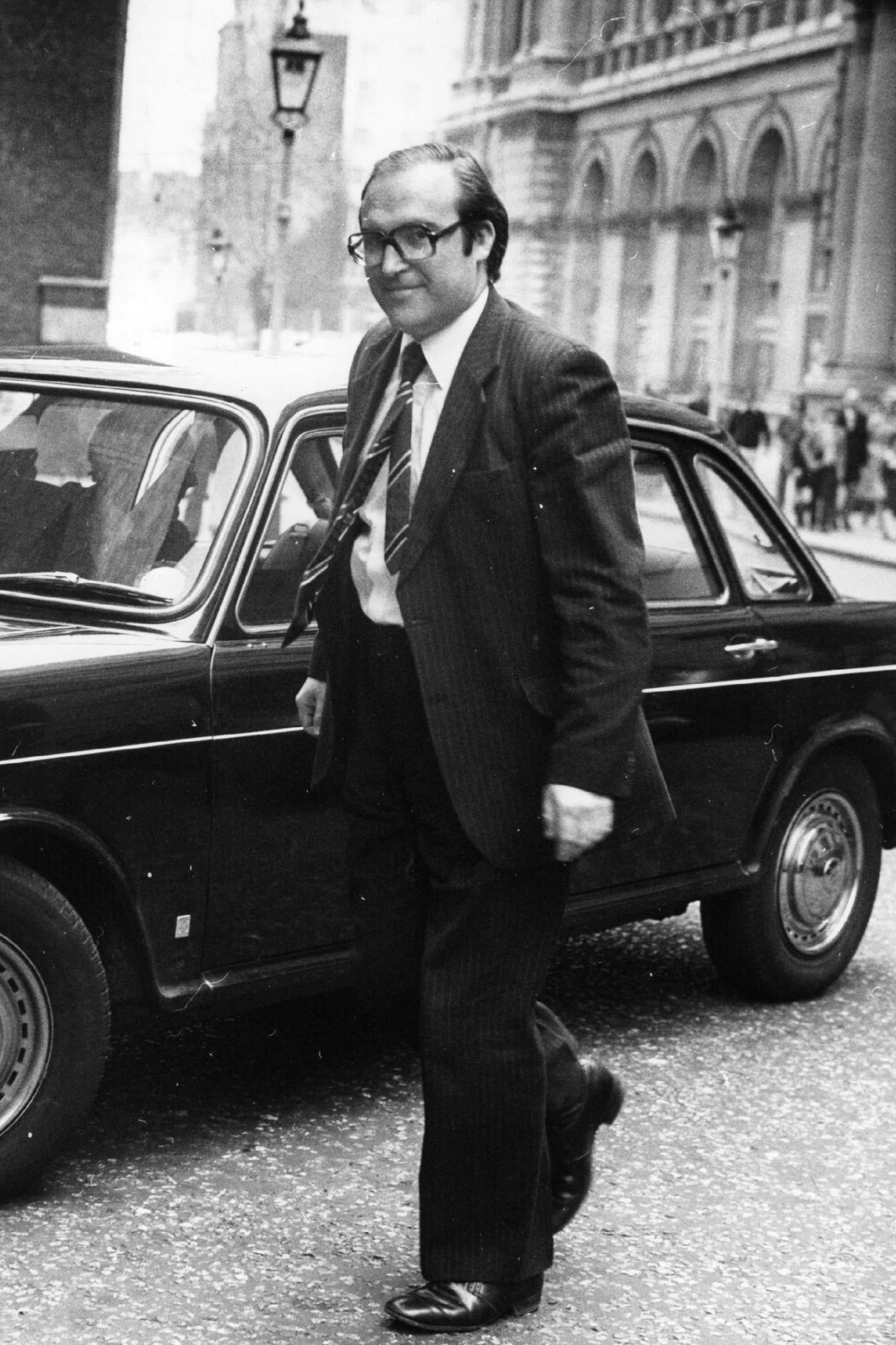
As his intractable opponent on Scottish devolution, I must pay tribute to Smith’s parliamentary skills. It is useful to give a flavour of those 47 parliamentary days on the floor of the House of Commons in 1977-78. Speaking opposite Francis Pym, who was then leading for the Tories, he said:
"I gathered from his speech that the Conservatives were generally in favour of the principle, but thought that the way in which the matter should be approached was to get an all-party consensus on the matter, but somehow the Government had been failing in the past in not seeking such a consensus, and that if a constitutional commission were called, it could within six months devise a workable scheme. It would not have to be some make-believe assembly – because the Right Honourable Gentleman said that it must be of real help to Scotland; otherwise it would not be worth doing."
Smith, with a tremendous smile and twinkle that flashed out of his spectacles, added:
"Then with a roll of drums, the Right Honourable Gentleman said that he would be especially frank about devolution – even about his own party. It then emerged that he was talking of a speech that he had made at St Andrews University, where he said that there should be an assembly. He did not say in his speech that it was to be directly elected, but in The Right Approach (the Tory manifesto of the day) it says ‘directly elected’, and I imagine that all Conservative speeches are to be construed to make sense out of The Right Approach. I think we must assume therefore that it would be a directly elected assembly."
Smith was the past master of the style of parliamentary tease to make a serious point. Pym was only the first of a series of distinguished Conservative frontbenchers and ministers who were obliged to squirm with watery smiles in the face of Smith’s forensic goading. A great parliamentary orator Smith was not. But as an operator with a capacity to make both sides of the House of Commons laugh – no mean feat – he was unequalled in my 32 years in the House.
After the Scotland and Wales Bills were through the Commons, though not through the referendum, Jim Callaghan, with Michael Foot’s support, promoted Smith to be secretary of state for trade and the youngest member of the cabinet following the retirement of Edmund Dell in November 1978. He proved himself by introducing a complex companies bill, banning insider trading. He was particularly suited for the trade slot through a long-standing interest in Russia. His wife, Elizabeth Bennett, to whom he was devoted, was the driving force in the Scotland/USSR Society and has many Russian friends and a great knowledge of the Eastern Bloc.
When Labour went into opposition, he was elected to the last place on the shadow cabinet and became spokesman on trade, prices and consumer protection. The early 1980s were a difficult time for both Smith and the Labour Party. He gained credit in parliament by forcing an emergency debate on Rupert Murdoch’s merger of the Sunday Times and The Times in January 1981. In November his shadow cabinet vote soared to 111 votes and he was once again in the inner circle of the party. Typically, albeit Roy Hattersley’s election manager, he preserved his good relations with Neil Kinnock, who in turn made him employment spokesman, shadow industry spokesman, and shadow chancellor, a role that he occupied from 1987 to 1992.
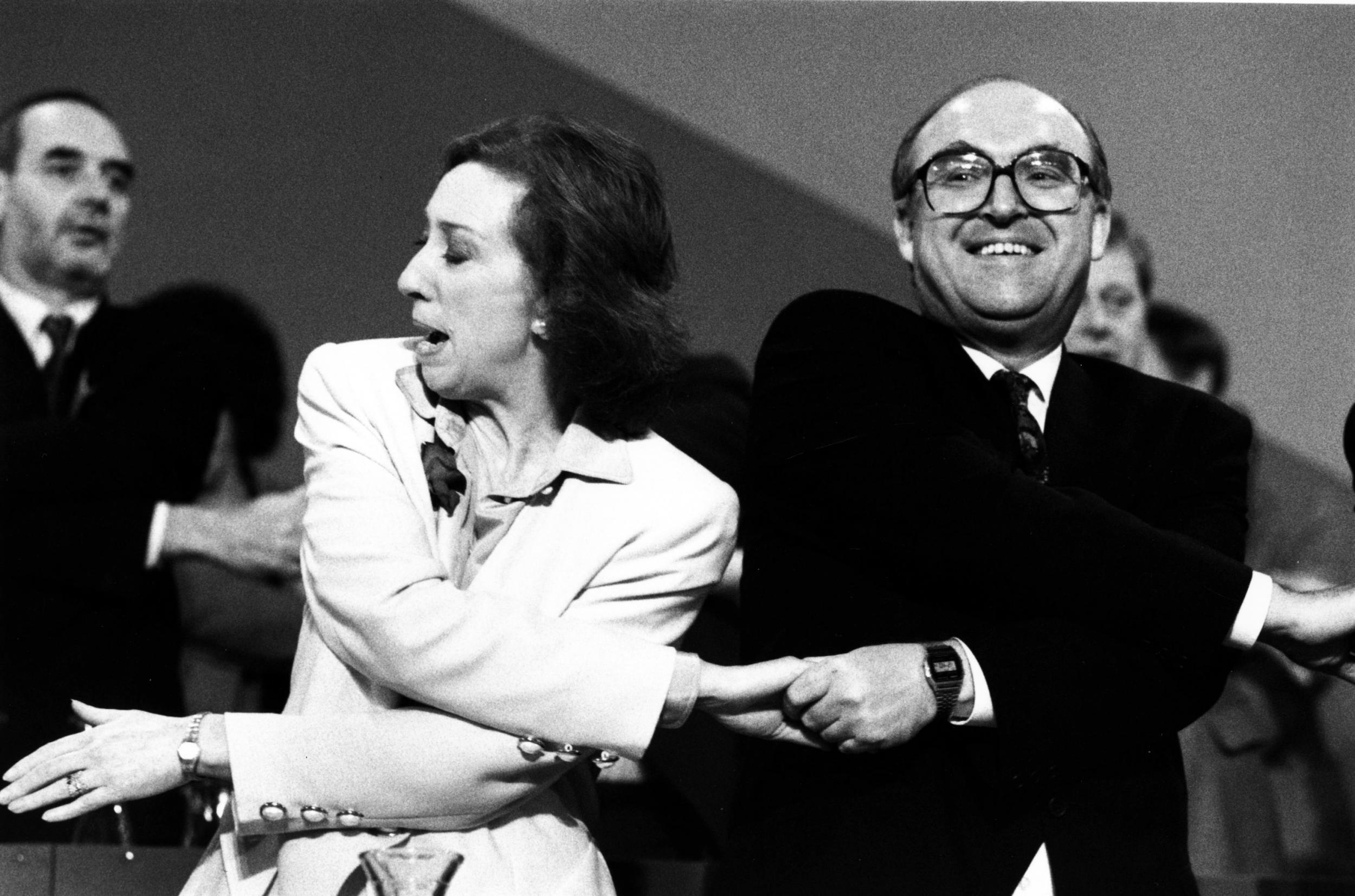
Smith’s other life in the 1980s gave him an equanimity which most politicians do not have. He was involved in many picturesque Scottish trials. For example, one of his clients was Thomas ‘The Shadow’ Lafferty. Lafferty was charged with the attempted murder of Andrew ‘Fat Boy’ Doyle and a 15-year-old girl who had been in his ice cream van when shots were fired. Lafferty had been in trouble with the courts from the age of nine.
He and his brother-in-law ‘TC’ Campbell had been tried but acquitted in 1980 on a charge of aiding the escape of three Glasgow gangsters who broke out of a top-security prison, Barlinnie, in Glasgow. Smith’s line of defence as counsel was to build up a notion of Lafferty as an unconscionable drunkard who was far too unreliable to be exploited as a hitman by any serious gangster. Smith won his case; his client Lafferty was acquitted of attempted murder and convicted of a lesser charge of ‘assault’ with intent to endanger life. He got three years, which was a triumph for Smith. His colleagues, me included, said that if we ever got into trouble we would certainly hire John as our advocate. This is how Smith took his mind off total involvement in Labour’s civil war.
Back in 1965, I asked Harold Wilson how difficult it was being prime minister. He replied: "Not half as difficult as being leader of the opposition, and that wasn’t half as difficult as being shadow chancellor of the exchequer, the most difficult job of all in British politics."
I shall never forget meeting Smith at 11.40pm outside the Savoy Hotel one night during the Labour Party conference in Blackpool [in 1988]. I said: ‘What the hell are you doing at this time of night when you should be tucked up in bed with your speech to make tomorrow morning?’ Smith replied: “I’ve just been on The World Tonight. It’s not only my speech but Brian Redhead wants me on his programme at 25 to seven tomorrow morning.”
This was an indication of the giddy load to which those in the stratosphere of politics are subjected. A fortnight later Smith had his first heart attack. But for the presence of mind of Elizabeth Smith and the fact that he suffered the attack in the Royal Infirmary of Edinburgh as he was doing up a shoelace, it might have been fatal then.
Smith perfected his teasing style as shadow chancellor. Few who were there will forget how he charmed the House of Commons during the Autumn Statement postponed to February 1991.
Smith: It is important to give some attention in this debate to the problems facing people in difficult circumstances which flow directly from the government’s policies. I am sorry to say that the chancellor of the exchequer did not manage to find a word to say about them in his speech.
Mellor (Treasury chief secretary): Where is the pain-free alternative? What policy is the Right Honourable and Learned Gentleman proposing?
Smith: I do not think that I have ever heard a question such as that from any minister since I came to the House of Commons (laughter). I accept that the chief secretary appeared to have genuinely an enquiring tone. He knows that his government’s policies are not working so he says in despair, ‘Is there something better?’ I give him one. If the Right Honourable and Learned Gentleman were to rid his mind of some of its prejudices, he would carefully consider the use of credit controls to control demand rather than high interest rates. That would be a much better and a much less painful alternative. After all, it is what some European countries do, and they appear to get by without difficulty. I shall cherish the Right Honourable and Learned Gentleman’s intervention long after the memory of this debate has faded.
Members of parliament will cherish the memory of John Smith’s sparkling performances and his enhancement of life in the corridors of the House of Commons long after the memory of the politics of this period has faded.
John Smith, politician and former leader of the Labour party, born 12 May 1994, died 13 September 1938
Tam Dalyell died in 2017
Join our commenting forum
Join thought-provoking conversations, follow other Independent readers and see their replies
Comments